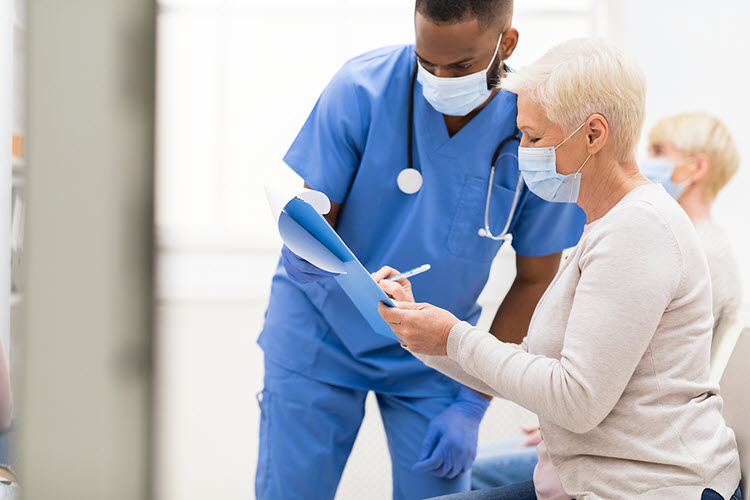Should I wait to get a mammogram?
243 million vaccine doses have been given in the U.S. with 103 million people fully vaccinated. As of the publication of this article, that translates to 31.5% of the population being fully vaccinated. We still have a long way to go to reach that 70-80% threshold for herd immunity.
This translates into a significant portion of the United States getting accurate information about the vaccine and what to expect. This post is a compilation of tips from articles in the Washington Post and AARP. Links to the original articles are included.
If you have not been vaccinated yet.
The Center for Disease Control (CDC) recommends not taking pain relievers like ibuprofen or acetaminophen prior to vaccination as a preventive for headache, fever or chills, all common side effects of the vaccine. It is possible that pain relievers can dampen the effectiveness of the vaccination. Research on the change in effectiveness of the vaccine is limited, but the recommendation is to be cautious.
Talk to your doctor if you have a chronic condition like arthritis about taking or skipping medications the day of the vaccine.
Do eat before you go and drink plenty of fluids before and after the shot. Mild exercise like walking before and after can also help. If you experience headache, fever or chills after being vaccinated, then take the aforementioned pain relievers.
What side effects can you expect?
Most people experience a sore arm after the first dose and many have more side effects after the second dose. Second dose side effects can come on a day or two later and in addition to a sore arm, can include headache, tiredness, muscle and joint pain, chills and fever. It is a good idea to wait several weeks after the second dose to schedule a mammogram since swollen lymph nodes under the arm can be another symptom.
Fever/chills/muscle pain: pain relievers like Tylenol or an NSAID like Advil or Motrin
Headache: pain relievers and plenty of rest
Fatigue: a nap, brisk walk or other exercise
Pain, swelling or a delayed rash at the injection site: use or exercise your arm and apply a cool, wet wash cloth to the area
https://www.aarp.org/health/drugs-supplements/info-2021/pain-relievers-covid-vaccine.html
https://www.aarp.org/health/conditions-treatments/info-2021/older-people-covid-vaccine.html
Should you skip the second dose?
If you are questioning the necessity for a second dose, there are some good reasons for not missing it.
- There is likelihood of longer immunity with the second shot.
- It provides stronger protection against the variants and since a virus is always looking to mutate, this is not insignificant.
- The side effects are still better than the disease.
What happens if you miss your second dose?
The timing of your second dose can conflict with life events like a graduation. If you know about the conflict when you are given the date to return, let the healthcare worker know and ask how you can reschedule it.
If you miss the CDC’s recommended six-week window for your second dose for some reason, don’t skip it and don’t mix vaccines when you do go back for the second dose. Contact your state COVID-19 hotline and ask for the best way to sign up for the second dose.
https://www.aarp.org/health/conditions-treatments/info-2021/why-to-get-second-vaccine-shot.html?
Now that you are vaccinated, what do you do with the vaccination card?
The small white vaccination record card that is issued by the Centers for Disease Control (CDC) should have been given to you after your first shot. Its primary function is to serve as a personal immunization record. There is currently no legal purpose to it.
However, you want to keep it safe by making a copy and keeping it with important papers like your passport. A digital copy on your phone can be helpful but be cautious. This card has identifying information on it like your name and birth date. If your phone is not password protected or enabled through a digital fingerprint, you may not want to keep a digital copy on your phone.
It is not a good idea to laminate your card since there is room on it to document a booster shot if in the future it becomes necessary.
Bring the card to your doctor so they can input the vaccination information into their records. This gives you an additional way to access the information (e.g. name, birth date, vaccine lot number).
What happens if I lose my card?
Bring your ID and the date you were vaccinated to the vaccination site and see if they can give you a replacement.
Keeping your proof of immunization safe may become important in the future. Currently, there is no need to show proof of vaccination at sporting events, concerts or going back to work. If you keep the card with your passport, it will be handy since a growing list of countries and some cruise lines are welcoming fully vaccinated American travelers. At the moment, the biggest benefit is in claiming free vaccine-related promotions like those from Krispy Kreme.
https://www.washingtonpost.com/lifestyle/2021/04/17/vaccine-card-record-covid-passport/?
Having a conversation with anyone who is reluctant to get vaccinated is fraught with pitfalls. Here is an article with tips to approach the discussion. After all this is a medical decision.
Disclaimer: The material in this blog is for educational purposes only. It is not intended to replace, nor does it replace, consulting with a physician, lawyer, accountant, financial planner or other qualified professional.
Deb is available as a caregiver consultant. She will answer the question: “Where do I start?” and find the resources to alleviate your stress. If you would like to invest a half hour to learn how she can help you, please contact her at: Free 30 minute consulting call
Deb is the author of “Your Caregiver Relationship Contract.” This book explains how to have an intentional conversation and the how unspoken expectations can cause problems. Click here to learn more about Your Caregiver Relationship Contract.

